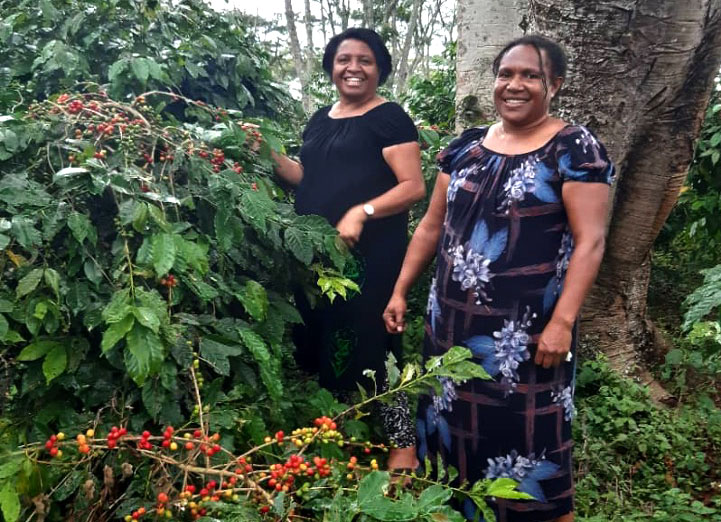
USAID improves economic opportunities for women coffee farmers in rural Papua New Guinea
Success Stories August 17, 2022
June 2022 – Coffee is one of Papua New Guinea’s (PNG) most valuable export crops and an important part of local economies in several highlands provinces, with an estimated 400,000 smallholders growing coffee and about three million people reliant on income from it. In PNG, gender inequality prevents many women from fully participating in, benefiting from, and contributing to the coffee value chain (and wider PNG economy). Among coffee smallholders, men tend to monopolize income from the sale of coffee despite women doing a substantial amount of the labor in the value chain [1].
Nevertheless, some women entrepreneurs are helping women stake a greater claim to the coffee industry in PNG. One such woman is Carolyn Papaso, who operates a small business buying and selling coffee beans in the Eastern Highlands Province. Carolyn understands the challenges women in her community have trying to take their coffee to market. In her community of Sogopeigu, many smallholders do not have the financial knowledge, investment capital, or market access to take their produce direct to market, and instead rely on intermediaries to pulp, dry, package and transport their coffee cherries for sale in more lucrative markets.
Through Carolyn’s small-scale business, she helps provide a source of income for at least 50 female farmers and their families in her community. However, Carolyn is determined to do more, and now, through USAID’s PNG Lukautim Graun Program’s (LGP) support to rural farmers, she is able to make her dream a reality.
Carolyn Papaso and her friend Leah Manape recently completed a USAID-supported financial literacy training of trainer’s course in the Eastern Highlands Province. They are now both certified trainers equipped with the knowledge and skills to teach other people in their local community the basics of financial literacy, such as how to save money, budget household finances, and access online digital finance. These skills are the foundation for creating new enterprises and increasing household and personal financial security, particularly for women.
After Carolyn and Leah completed the financial literacy course, USAID’s LGP assisted them to register their association, Emerging Women, and connect them to the Coffee Industry Corporation (CIC). The CIC is the regulator of the coffee industry in PNG whose goal is to increase financial returns, productivity, product safety, quality and market access for smallholder coffee farmers and other actors along the value-chain.
In addition, through LGP’s livelihood and gender programs, entrepreneurs like Carolyn and Leah can access to new market opportunities like the potential agreement currently in negotiation for Emerging Women to supply coffee to Coral Sea Hotels, a national chain of hotels and the largest in the country. Once this agreement is finalized, Emerging Women and the rural coffee famers they support will become part of the Coral Sea Hotels supply chain, resulting in the prospect of improved livelihood opportunities for the women and families of Sogopeigu community.
“Thanks to USAID’s support, I am able to better help the women in my community,” said Carolyn Papaso.
Carolyn and Leah have already started preparations to conduct financial literacy trainings, particularly for women, and plan to roll out the trainings to their community later this year.
Improving the economic empowerment of women and providing alternative livelihood opportunities for people in rural communities decreases their reliance on forest resources, which helps to reduce threats to PNG’s biodiversity. Led by Cardno International Development – a DT Global Company, USAID’s Lukautim Graun Program is working in partnership with the Government of PNG, civil society groups, private sector organizations, and local communities to implement change in the lives of women and help protect the country’s unique biodiversity and natural resources for future generations.
Endnote:
- Women’s Economic Empowerment among Coffee Smallholders in Papua New Guinea, 2020
